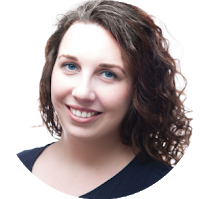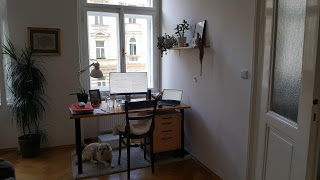I am Anna Clemens, and This is How I Work
 Today, I am interviewing Dr. Anna Clemens. Anna is a scientific writing coach and editor with a PhD in chemistry/materials science. She helps scientists to write better papers and grant proposals in less time and regularly blogs about scientific writing. She’s passionate about making academia a better place to work and helping scientists to succeed in their career. In her spare time, she writes her own articles for popular science magazines, such as »Spektrum der Wissenschaft« and »Scientific American«, and goes on hiking trips with her dog Zuza. You can connect with her on Twitter and LinkedIn or reach out by email: edit_at_annaclemens.com
Today, I am interviewing Dr. Anna Clemens. Anna is a scientific writing coach and editor with a PhD in chemistry/materials science. She helps scientists to write better papers and grant proposals in less time and regularly blogs about scientific writing. She’s passionate about making academia a better place to work and helping scientists to succeed in their career. In her spare time, she writes her own articles for popular science magazines, such as »Spektrum der Wissenschaft« and »Scientific American«, and goes on hiking trips with her dog Zuza. You can connect with her on Twitter and LinkedIn or reach out by email: edit_at_annaclemens.com
Current Job: Scientific Writing Coach & Editor
Current Location: Prague, Czech Republic
Current mobile device: Samsung S6 (I tend to adopt my friends’ old devices they aren’t using anymore ?)
Current computer: Dell XPS 13
Can you briefly explain your current situation and research to us?
I help scientists to write papers for high-impact journals and grant proposals that get funded, and my services are ideal for new principal investigators (e.g. Assistant and Junior Professors). I focus on using the concept of storytelling to help my clients to write scientific articles and funding applications that are clear, concise and accessible to broad audiences.
I’m also a science writer and I try to write a few articles per year for popular science magazines.
What tools, apps and software are essential to your workflow?
Oh, I have to admit I love productivity apps! BUT: I force myself to use as few as possible. I found that in order to be productive it’s a lot more essential to create systems that work for you instead of spending time learning new tools or feeding them with data.
As for the software and apps I currently use, I mainly rely on Microsoft Office products: To review and edit my clients’ papers and proposal, I use Word – the commenting and track-changes functions are crucial! I also use Outlook for email, calendar and task lists – it’s an incredibly powerful piece of software although admittedly it doesn’t look very good and isn’t very user-friendly. And I keep many of my lists and other spreadsheets I need in Excel.
To meet my clients in strategy sessions, I use a video conference software called Zoom, which I’m a big fan of. You can easily share screens and record the sessions and the video and audio quality is high.
When I have larger projects, e.g. when I’m writing an article, I like to use Trello – both as a project management tool and to keep track of information I read.
I also use the note-taking app on my phone quite a lot when I’m on the go. For example, I keep a list there with books I want to read, topic ideas I get for upcoming blog posts, and notes when I’m listening to an audio book while out walking with my dog.
What does your workspace setup look like?
I have a home office. And (despite what you usually hear people say) it works really well for me! Once or twice a week I go to a café for a few hours if I need a change of scenery. I like to meet friends to co-work too or go to a co-working space. That’s also a great opportunity for me to network.
What is your best advice for productive academic work?
Can I offer three? ?
The first (and most important one) would be to reflect on what works for you and start tweaking your work habits from there. If writing daily doesn’t work for you, don’t force yourself to do it. If you aren’t a morning person, don’t set your alarm for 5am. Find out instead when and under which circumstances you work well and go from there. I know from my own experience that it can be incredibly hard to break free from the norms around e.g. working early in the day and in your office. But it’s worth it!
The second one would be to make sure that what you spend your time doing every day is aligned with your overall goals. It’s easy as an academic to get stuck in admin tasks and departmental meetings while what’s actually moving your career forward would be discussing data with your lab members, publishing papers and winning grants.
And my third piece of advice is: Theme your days! If you know that you’re doing all admin tasks on a Friday, you don’t need to stress (or even think) about them on a Monday or Wednesday. And conversely, if Monday and Tuesday are your writing days, protect them and don’t schedule any meetings then. This approach has made such a difference for my productivity!
How do you keep an overview of projects and tasks?
Here’s my system: Every week on a Friday, I look at my calendar for the upcoming week and my task list. Based on this, I create to-do lists for each day of the week. At the end of each day, I review and adjust the list for the next day.
I like using pen and paper for these daily lists – checking off items is more fun this way ? I also keep some space there for notes and thoughts that come up during the day. Once it’s Friday, I review all those notes, and either take action or file them in the appropriate place, e.g. as a task in my general task list.
If I need to keep track on the progress of bigger projects, I use Trello in parallel.
Besides phone and computer, do you use other technological tools in work and daily life?
I have an eBook reader but that’s it.
Which skill makes you stand out as an academic?
Writing (perhaps not so surprisingly) ?
What do you listen to when you work?
The snoring of my dog ? All joking aside, I need it to be quiet when I’m editing or reviewing a client’s paper or proposal. When I’m doing tasks that don’t require such focus, I like to listen to music – for example to a German radio station called “byte.fm” to check out indie pop/rock music that has been released.
What are you currently reading? How do you find time for reading?
I’m currently reading “Why we sleep” by Matthew Walker (as an audio book) and “The people in the trees” by Hanya Yanagihara. I like both! I read the most when I travel but am now trying to read at least half an hour before going to bed. Listening to audio books is easier for me because I’m out walking with my dog a lot. Apart from audiobooks I also listen to a ton of podcasts.
Are you more of an introvert or extrovert? How does this influence your working habits?
I’m an introvert – in the meaning of that I recharge when I’m on my own. I still like to socialise and am generally not shy around people, but it takes energy from me. This is probably why it suits me so well to work from home on my own – I feel like this way I can be the most productive.
What’s your sleep routine like?
Since starting to read “Why we sleep” (see my answer to question #9), I’ve realised how important sleep is and that’s why I’ve started to prioritise it. I go to bed somewhere around 10-12pm and don’t set an alarm for the next morning. I typically wake up at 7:30am on my own.
What’s your work routine like?
I’m a big proponent of working fewer hours and using them as productively as possible. I typically work for six hours every day – from midday until 6PM. I have quite an extensive morning routine that includes journaling, learning a language (currently Czech), meditating and exercise. I also do any household chores in the mornings and walk, play with and train my dog.
What’s the best advice you ever received?
Trust yourself!

